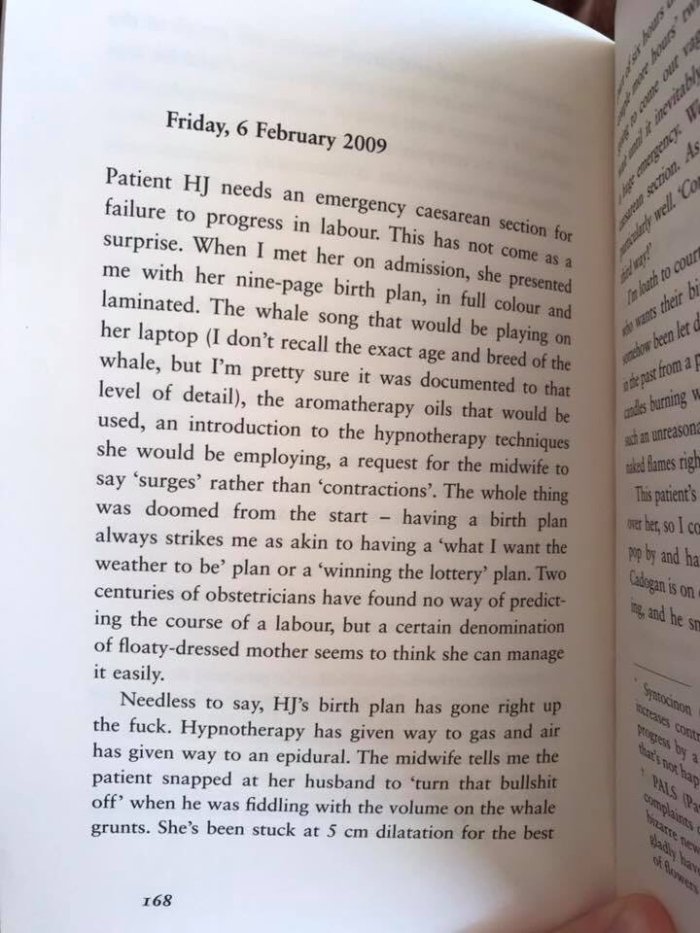A few weeks ago, this excerpt from Adam Kay’s memoir This is Going to Hurt was doing the rounds on Twitter. Kay’s book recounts his experiences as a junior doctor working in obstetrics, and this particular excerpt caused a lot of disapproving comment:

(I actually enjoyed Kay’s book and mostly he comes across as a human and decent individual. Still, he wrote this passage, so one assumes he stands by it.)
More recently, Amy Tuteur, who blogs as the Skeptical Ob, attacked an article by Justine Van der Leun about her difficult pregnancy. Van der Leun complained about the language used by the medical professionals treating her, using terminology such as “incompetent cervix” and “blighted ovum”.
Tuteur’s regards Van der Leun as “self-absorbed” and writes:
“Oh, grow up! It’s hard to imagine anything more immature than facing a life and death situation and whining about the language that doctors used to describe it.”
And now we have an obstetrician called Aoife Mullally express her views on women’s expectations of birth. According to an article in the Irish Times,
“Dr Mullally said everyone would ‘know the women because we’ve all had them’ who “think they are the only woman who’s ever given birth and they certainly think they are the only woman giving birth in the labour ward that day”.
She also said:
“For many women the birth experience has acquired a similar status to one’s wedding day – over privileged, over-anxious middle-class ‘birthzillas’ harassing well-meaning hospital staff with unrealistic birth plans, all the while egged on by ill-informed, overpaid midwives and doulas.”
(The Irish Times claims here that she is quoting Tuteur, but in fact it seems to be a quote from Victoria Smith paraphrasing Tuteur’s views in the New Statesman.)
Dr Mullally also apparently asked whether it was feminist to revere “effortlessly fertile, blissfully pregnant women who find affirmation in the excruciating”.
Sneering at women: the best sport of all
Women, eh? What are they like, with their ridiculous expectations of wanting to be treated as autonomous human beings? Middle-class women are the worst, as we all know: spoilt, entitled, privileged (words that are hardly ever applied to men). Even women seem to think of other women in this way.
There is a debate to be had – and is indeed being had – about how much medical intervention there should be in childbirth. Is medical intervention in childbirth frequently unnecessary, something that detracts from women’s ability to give birth normally? Is it a consequence of medics’ over-zealous desire to interfere in a process that would proceed quite smoothly if women were just left to get on with it? Or is medical intervention absolutely essential, something that has saved the lives of countless women and their babies?
The point is that it should be possible to have this debate without attacking women, either for being foolishly and self-indulgently wedded to the idea of a normal birth, or, on the other hand, for being too cowed, too frightened, too in thrall to medical science to attempt a normal birth. This is a debate that should be carried out between medical professionals: they, after all, are the ones who have a fundamental disagreement about how to manage childbirth. Argue it out amongst yourselves, but please don’t start blaming women for your disagreements. (Incidentally, is there any other area of medicine where professionals are so at war with each other over the best approach to patient care? It hardly inspires confidence.)
But women are an easy target. People seem to relish attacking women for their “privilege”, even though giving birth rarely feels privileged, and more often feels painful, exhausting and traumatic. It doesn’t feel privileged to be left permanently incontinent, or in chronic pain, though such women are usually told to be grateful that they and their baby are alive.
When men go into hospital to have, say, an appendectomy or heart surgery, no-one attacks them for their unreasonable expectation that they will be given the appropriate amount of anaesthetic, or that their stiches won’t be infected, or that they will be given pain relief when they ask for it. No-one calls them “spoilt” or “entitled” or reminds them how lucky they are to live in an age when medical intervention saves lives. No-one tells them to just shut up and be grateful.
As Victoria Smith puts it:
“The sneering dismissal of women having inner lives as some pointless middle-class indulgence has worked very successfully to undermine the authority of far too many feminist voices. The implication is that, if you care whether or not women are treated like complete human beings, with experiences of their own, you are focusing on some added extra: the icing on the cake of women’s liberation, as opposed to the most basic principle of all.”